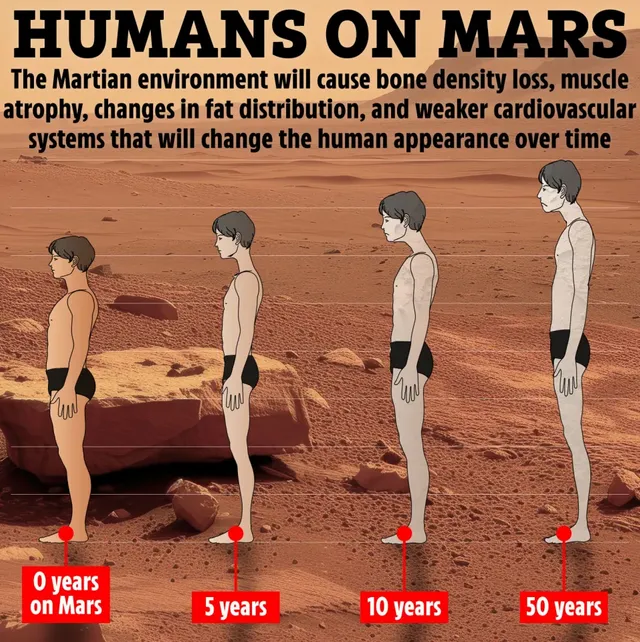Can Human Body Survive on Mars?
The present Human body is a result of millions of years of evolution to suit Planetery position of Earth (vis-a-vis Sun and Moon) and atmospheric, climatic conditions...
Do u think it can adjust to Mars? Lets find out...
The human body has evolved over millions of years to thrive in Earth’s specific conditions—its gravity, atmosphere, climate, and proximity to the Sun and Moon. Adapting to Mars poses significant challenges because the environment there is radically different. Let’s break it down and explore how humans might adjust, both naturally and with technological assistance.
Gravity
Mars has about 38% of Earth’s gravity. Over time, this lower gravity would affect the musculoskeletal system. Bones lose density without the constant stress Earth’s gravity provides, and muscles weaken from reduced resistance. Astronauts on the International Space Station, in microgravity, lose 1-2% of bone mass per month, and Mars’ partial gravity might slow that but not stop it entirely. Long-term, humans on Mars could evolve lighter skeletons and less muscle mass if natural selection favored those traits in that environment.
Atmosphere
The atmosphere is another hurdle. Mars’ air is thin—about 1% of Earth’s pressure—and mostly carbon dioxide, with little oxygen. Humans can’t breathe it, so immediate survival requires artificial habitats or suits with oxygen supplies. Over generations, if genetic mutations somehow enhanced lung capacity or oxygen efficiency (like high-altitude Earth populations such as Tibetans with their hemoglobin adaptations), that might help. But natural adaptation to breathe Martian air is unlikely without extreme, sci-fi-level evolutionary leaps.
Temperature on Mars swings wildly, averaging around -80°F (-62°C), far colder than Earth’s habitable zones. Human bodies regulate heat well on Earth, but Mars would demand external insulation or heating. Evolutionary changes like thicker skin or subcutaneous fat could emerge over millennia, akin to how Arctic populations adapted to cold, but that’s a slow process.
[Human Body's evolution on Mars]
Radiations
Radiation is a bigger issue. Mars lacks a strong magnetic field and thick atmosphere to shield against solar and cosmic rays. On Earth, we’re protected; on Mars, radiation doses could be 50-100 times higher. This increases cancer risk and DNA damage. Over many generations, humans might develop better DNA repair mechanisms or radiation-resistant traits, but that’s speculative and would take thousands of years. Short-term, we’d rely on shielded habitats or underground living.
Body and Time Cycles
Then there’s the psychological and physiological rhythm tied to Earth’s 24-hour day. Mars’ day (sol) is 24.6 hours, close but not identical. Our circadian rhythms could adjust, as they do for shift workers, but the weaker sunlight and lack of Earth’s seasonal cues (due to Mars’ different orbit and tilt) might mess with mental health and hormonal balance. Tech like artificial lighting could mimic Earth conditions, but natural adaptation would lag.
Evolution vs Technology
So, how can humans adjust? In the short term, not through evolution but through engineering—sealed habitats, oxygen generators, radiation shields, and maybe even gene editing to tweak radiation resistance or bone density. Long-term, over tens or hundreds of thousands of years, natural selection could reshape us: lighter bodies, more efficient oxygen use, radiation tolerance. But that assumes a stable population surviving Mars’ harshness, which tech would need to enable first.
It’s less about the body adapting quickly and more about us bending Mars to our needs—or tweaking ourselves artificially to fit it. What do you think—rely on tech, or gamble on slow evolution? Please comment

